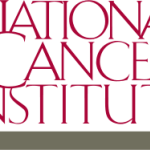- المجال: Government; Health care
- Number of terms: 6957
- Number of blossaries: 0
- Company Profile:
The National Cancer Institute (NCI) is part of the National Institutes of Health (NIH), which is one of 11 agencies that compose the Department of Health and Human Services (HHS). The NCI, established under the National Cancer Institute Act of 1937, is the Federal Government's principal agency for ...
A humanized monoclonal antibody directed against the human alpha v integrin subunit with potential antiangiogenic and antineoplastic activities. Anti-human integrin alpha v subunit monoclonal antibody EMD 525797, a chimeric antibody which includes the antigen binding sites of the anti-integrin mouse antibody 17E6, binds to and inhibits the activity of alphavbeta3 integrin (vitronectin receptor); this may result in the inhibition of endothelial cell-cell interactions, endothelial cell-matrix interactions, and integrin-mediated tumor angiogenesis and metastasis in alphavbeta3-expressing tumor cells. Alphavbeta3 integrin, a cell adhesion and signaling receptor, is expressed on the surface of tumor vessel endothelial cells and plays a crucial role in endothelial cell adhesion and migration.
Industry:Pharmaceutical
A humanized monoclonal antibody directed against the human A33 antigen. Monoclonal antibody A33 recognizes the human A33 antigen, a 43 KDa transmembrane glycoprotein of the immunoglobulin superfamily, which is highly and homogenously expressed in 95% of colorectal cancer metastases with only restricted expression in normal colonic mucosa.
Industry:Pharmaceutical
A humanized monoclonal antibody directed against the epidermal growth factor receptor (EGFR) with potential antineoplastic activity. Nimotuzumab binds to and inhibits EGFR, resulting in growth inhibition of tumor cells that overexpress EGFR. This agent may act synergistically with radiation therapy.
Industry:Pharmaceutical
A humanized monoclonal antibody directed against the cell surface receptor CD30 with potential immunotherapeutic activity. Anti-CD30 monoclonal antibody XmAb2513 specifically binds to the CD30 antigen, which may result in a cytotoxic T lymphocyte (CTL) response against CD30-expressing tumor cells. CD30, a member of the tumor necrosis factor (TNF) receptor superfamily, is expressed on activated lymphocytes transiently and is constitutively expressed in hematologic malignancies including Hodgkin's disease and some T-cell non-Hodgkin's lymphomas.
Industry:Pharmaceutical
A humanized monoclonal antibody directed against the cell surface oncofetal protein glypican-3 (GPC3) with potential antineoplastic activity. Anti-GPC3 monoclonal antibody GC33 binds to GPC3 and triggers a host immune response against GPC3-expressing tumor cells, which may result in tumor cell death. GPC3, a heparin sulfate proteoglycan, is frequently upregulated in hepatocellular carcinoma and mesoderm-derived organs such as the liver, lungs, and kidney.
Industry:Pharmaceutical
A humanized monoclonal antibody directed against the CD40 receptor with potential antineoplastic activity. Dacetuzumab specifically binds to and inhibits the CD40 receptor, thereby inducing apoptosis and inhibiting cellular proliferation via antibody-dependent cellular cytotoxicity (ADCC) in cells that overexpress this receptor. The CD40 receptor, a member of the tumor necrosis factor (TNF) receptor super-family, is highly expressed on most B lineage hematologic malignancies including multiple myeloma, non-Hodgkin's lymphoma, chronic lymphocytic leukemia, Hodgkin's disease and acute lymphoblastic leukemia.
Industry:Pharmaceutical
A humanized monoclonal antibody directed against the activator of g-proteins signaling (AGS) cell surface protein AGS-8 with potential antineoplastic activity. Anti-AGS-8 monoclonal antibody AGS-8M4 selectively binds to AGS-8, triggering complement-dependent cell lysis and antibody-dependent cell-mediated cytotoxicity in tumor cells expressing AGS-8. While normally expressed at low levels in the heart in response to ischemia, AGS-8 has been found to be expressed in more than 70% of ovarian neoplasms.
Industry:Pharmaceutical
A humanized monoclonal antibody directed against the activator of g-proteins signaling (AGS) cell surface protein AGS-16 with potential antineoplastic activity. Anti-AGS-16 monoclonal antibody AGS-16M18 selectively binds to AGS-16, triggering complement-dependent cell lysis (CDCL) and antibody-dependent cell-mediated cytotoxicity (ADCC) in tumor cells expressing AGS-16. While normally expressed at low levels in the proximal tubules of the kidney, AGS-16 has been found to be overexpressed in more than 95% of kidney and 40% of liver neoplasms.
Industry:Pharmaceutical
A humanized monoclonal antibody directed against placental growth factor (PLGF) with potential anti-angiogenic and antineoplastic acivities. Anti-PLGF monoclonal antibody TB-403 binds to PLGF, inhibiting the binding of PLGF to the vascular endothelial growth factor receptor, which may result in the inhibition of tumor angiogenesis and tumor cell proliferation. PLGF is a protein that belongs to the family of vascular endothelial growth factors (VEGFs).
Industry:Pharmaceutical
A humanized monoclonal antibody directed against parathyroid hormone-related protein (PTH-rP). As a poly-hormone with diverse biological roles, PTH-rP is expressed by normal tissues, acting in local tissue environments in a variety of ways; it is commonly overexpressed by breast, prostate, and other cancers, acting systemically by promoting bone resorption, inhibiting calcium excretion from the kidney, inducing hypercalcemia, and possibly playing a role in the formation of bony metastases. By blocking the effects of PTH-rP on calcium metabolism, monoclonal antibody CAL may inhibit cancer-related hypercalcemia.
Industry:Pharmaceutical
